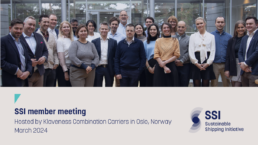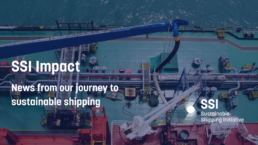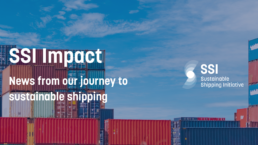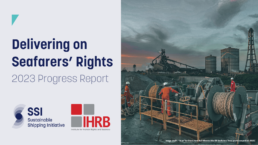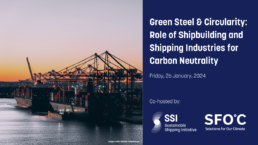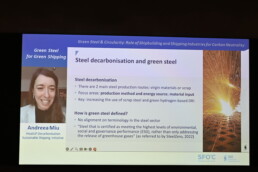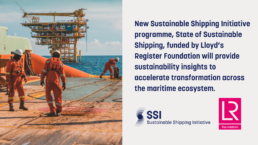16 December 2021 – September 2010 saw the announcement of the Sustainable Shipping Initiative, a new project which would examine “the challenges and opportunities which face the industry over the next 30 years and what it needs to do to ensure that, by 2040, it is robust and profitable with a strong record of social and environmental responsibility.”
Eleven years into that mission, SSI’s primary objective remains promoting and facilitating the transition to a more environmentally, socially and economically sustainable shipping industry. However, the landscape around it has changed dramatically. In the 2010 press release announcing the initiative, Forum for the Future’s Jonathon Porritt referred to “Smart shipping companies can see the way the wind is blowing”. In 2021, it is impossible for any actor across the shipping value chain to ignore the way the wind blows.
Sustainability and decarbonisation have become commonly understood terms across the shipping sector (even if definitions sometimes differ), and momentum continues to build and grow. 2015 saw the world coalesce around the Paris Agreement, which set the goal of limiting global warming to “well below 2 degrees Celsius”. Three years later, the IMO set out its initial GHG strategy, referring to “a pathway to CO2 emissions reduction consistent with the Paris Agreement temperature goals.”
At the end of 2021, it is clear that the focus has shifted from why sustainability is needed to how and when it can be achieved. The work is underway everywhere, as evidenced by the pilot projects and initiatives regularly produced by different stakeholders in the industry. Within this constantly changing landscape, I am proud to see SSI continue to work across the value chain. Bringing together charterers, classification societies, financial stakeholders, NGOs, as well as shipowners, managers and operators, SSI has always worked to accelerate progress in the industry through multi-stakeholder collaboration, ensuring no one is left behind.
The Roadmap to a sustainable shipping industry, launched in 2016 and updated in 2020 to reflect changes to the industry, relies on every actor across the sector taking action for a sustainable future across the six vision areas of Oceans, Communities, People, Transparency, Finance and Energy. Many of the challenges that we need to tackle often intersect two or more areas and requires connecting the dots to address systemic challenges – going beyond the symptoms to address the root cause and achieve long term, enduring impact.
I firmly believe that the potential for growth in SSI’s impact is huge, as more industry players add sustainability issues to their own agendas. Through our collective effort, SSI has continued to lead the narrative on wide ranging sustainability challenges for shipping in 2021, from defining environmental, social and socio-economic sustainability criteria for marine fuels to creating tools for protecting and respecting seafarers’ rights and wellbeing, to facilitating transparency around responsible vessel recycling and addressing emerging areas such as the potential of circularity for shipping.
As the focus remains on decarbonisation, SSI has worked to ensure that the industry’s decarbonisation is rapid and sustainable, avoiding negative externalities or shifting emissions up- or downstream across the fuel value chain, through the publication of Defining sustainability criteria for marine fuels. In addition to this, the launch of Exploring shipping’s transition to a circular industry explored the role of circularity for the future of the maritime industry, and discussed the need to consider embedded emissions and emissions from the construction and recycling phases of a ship’s lifecycle, as emissions from the operational stage decline with decarbonisation efforts.
In early 2022, we will focus on operationalising these two pieces of research to ensure that they are practical and useful for actors across the value chain – from the fuel producers, to the shipbuilders, to the ports and eventually the recycling yards.
At the same time, the risk of border closures and overwhelmed supply chains continues to pose a threat to seafarers worldwide, who have kept hospitals and supermarkets stocked throughout the pandemic with little recognition of their key worker status. SSI’s Delivering on seafarers’ rights Code of Conduct and self-assessment, developed in partnership with the Institute for Human Rights and Business and in collaboration with the Rafto Foundation and RightShip, provides a tool for shipowners, managers, operators and charterers to understand and improve their policies and actions on seafarers’ rights and wellbeing, covering a broad range of areas from working hours, to mental and physical wellbeing, to internet access while at sea.
As with all of our work, collaboration and partnering are paramount to ensuring the achievement of SSI’s objectives for the coming year. We continue to engage as part of the leadership group of the Getting To Zero Coalition’s Fuels and Technologies workstream, and we have become knowledge partners of the Blue Sky Maritime Coalition in North America as well as the UN Global Compact’s Ocean Stewardship Alliance. Through the Ship Recycling Transparency Initiative, we have also received funding from and worked closely with Engineering X, an international collaboration founded by the Royal Academy of Engineering and Lloyd’s Register Foundation.
I would like to thank all of SSI’s members and collaborators who consistently fly the flag for sustainability and support our work by providing necessary inputs and feedback reflecting their diverse viewpoints, stakeholder perspectives, and sustainability priorities. I would also like to thank the SSI Secretariat for their work in driving the research and consultation processes.
Looking forward to 2022 and beyond, SSI is now engaged in a strategy update process to review its objectives and better understand the rapidly changing landscape. However, our core remains the same, and we look forward to continued effort in driving action and raising awareness of sustainability issues across the maritime value chain, helping to connect the dots. As a maritime stakeholder, every one of us has a role to play in making a positive impact.
To learn more about sustainability in shipping and the role you can play, please review the Roadmap to a sustainable shipping industry.
Wishing all a good holiday season and a happy new year,

Guy Campbell
Chair
Sustainable Shipping Initiative


